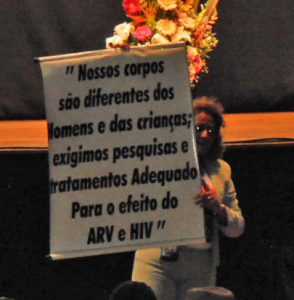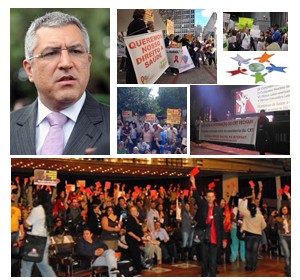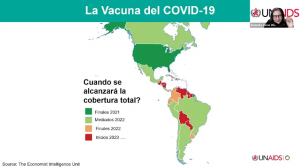The forum eventually took place in the last days of August as part of the National Prevention Congress in Brazil, and as we predicted in a previous article, participation by our counterparts in the region was very limited. Those who were able to take part participated as program speakers thanks to the generosity of the Brazilian government and certain agencies. There were fewer than one hundred international grants and some countries were absent. There were more speakers than audience as regards the regional dimension of the event. Some networks were also conspicuously absent.
It was also very difficult for the Key Correspondents team to be present and provide coverage. However, with the support of one correspondent, various colleagues and by garnering information from various sources, we have been able to put together for those who could not attend (who were in the majority) coverage in the form of twelve articles on what happened and what didn’t happen at the event.

We will not go into the much mentioned crisis of the response in Latin America, the response from civil society or the whole of the regional and worldwide partnerships which includes governments and agencies, as I believe that this has been covered enough in the articles prior to this editorial.
We already know that the Forum, in regional terms, perhaps did not contribute much to the debate or to advancing the agenda, and gave presentations that in many cases were public confessions of what should be done but is not done. These confessions at least saved us having to prove otherwise. It is good that we can all make ourselves heard, reflect and gain insights.
In this editorial I would like to reflect on the crisis that the response in Brazil is going through, because for those of us who have been working in this area for decades, Brazil and its multifaceted response has always seemed to be a model to follow, at times a utopia and experience to learn from greatly. I have been learning from Brazil for all these years and I think that paradoxically, with our sister nation’s capacity for thinking ahead, we can all learn a lot about what is going on now.
On Tuesday 28 August, at the opening ceremony, during every speech by officials of the Brazilian government the activists held up red cards, chanting and shouting out protests.

“Oh Dilma [Rousseff, Brazilian President], what a mess! Mixing laws with religion!” and “I have AIDS, I can’t wait, health is what matters” were some of the chants, along with banners reading “Dilma, the AIDS program is coming to its end: it hasn’t done what it was supposed to do, and it lets the Church run health policy”. State officials, in turn, made their case by calling for a multi-sector response with participation from all sectors, including activists.
One speech that was warmly received was that of Beto Volpe, of the National Network of People Living with HIV/AIDS (RNP+), who argued that the absence of top Government officials at the ceremony and the conference were a clear example of the lack of interest that the current administration shows in the issue. Volpe criticised the federal government´s veto of anti-homophobia kits in public schools, religious fundamentalism present in government and municipal decision-making, as well as major difficulties in the use of Target Action Plan (AMP) funds against the epidemic.
The president of the NGO AIDS Forum of the State of São Paulo, Rodrigo Pinheiro, made a timely protest about overcrowding among in-patients at hospitals due to the closure of wards, and the increase in the prevalence of HIV in high-risk groups.
Jehová Pessin Frogoso, of Grupo Esperanza, a social protest movement against hepatitis, argued that the disease is still ignored in Brazil, saying: “We hope that this time the hepatitis movement can really learn from the AIDS movement and we can stop being AIDS’ poorer brother”.

The Brazilian government, one of the most important in the region, is losing interest in AIDS. The new administration stops prioritizing health issues and the result is the same: more people exposed to HIV and dying. Some colleagues acknowledged off the record that this has caught them unawares, relatively demobilised, having “got used to the idea that the national government would always be committed”.
Like many others, these major Brazilian activists are tired, unmotivated and unemployed. They had tried to imagine a reality where “there was no more AIDS”. They can hardly be blamed for this. It is hard to agree with the officials and technocrats who argue that we are close to an “end to AIDS”. Far from it, in fact, and what is happening in Brazil now is a painful reminder that even where progress is made in great strides, this can rapidly be set back.
For now, bringing an “end to AIDS” sounds more like an advertising slogan, and as may happen with the “three zeros”, without money or commitment this may end up as simple rhetoric, nothing more than zero funding, zero new high-impact ideas to include more groups and attain greater access, and zero accountability.
The opinions expressed by activists at the Brazilian Forum have already had consequences. The Health Minister, Alexandre Padilha, met on 4 September with different figures of the multi-sector response and inexplicably “uninvited” the representative of the Network of Persons Living with HIV, José Rayan. We express our condemnation of this type of action, indicative of poor policy and institutional framework, and manifest our support for the RNP+.

The Brazilian case is emblematic. It is an early warning for everyone. Most of the people with HIV in the world live in middle-income countries, countries where international cooperation for development is now history and the only possible response is to “live with what we have”, namely doing advocacy work to increase national health and AIDS budgets, ensuring that there is investment in evidence-based interventions, and intensifying close monitoring.
Brazil and the Rousseff administration have clearly shown that this will be difficult to do. What hope then remains for the rest of the countries in the region? We all know the answer: a shortage of medical supplies, laws that criminalise transmission, little progress in research, judgement of cases of violence, the list goes on. The crisis is not just Brazilian. It has already reached our countries and the time has passed for diagnosis, self-criticism and repetitive rhetoric. The time has come for action.
Editor’s note: We are particularly grateful to our colleagues at the AIDS Brazil News Agency, the source of information and images for this and other articles. Complete coverage of the Forum and the issues mentioned here can be found at http://www.agenciaaids.com.br/










Añadir comentario